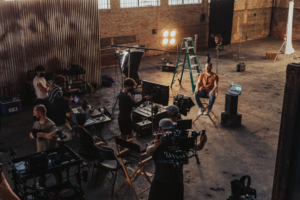A production assistant, also known as a film production assistant, set assistant, PA, and set PA, performs a range of delegated tasks for film and television productions. This is an entry-level position, which makes it a great choice for anyone breaking into the film or television industry. Because the work is so diverse, it is one of the best ways for industry newbies to learn more about film and television production. Most film departments have their own production assistants, such as art department production assistants and costume production assistants.
What Does a Production Assistant Do?
Working as a production assistant is a varied role. Production assistants do whatever their more senior production employees ask them to do. Their responsibilities usually depend on a production’s budget, the specific department they work in, and the confidence senior workers have in them.
Some duties they might perform include:
- Making coffee for cast and crew
- Copying scripts
- Faxing documents
- Answering telephones
- Transporting crew, cast, and equipment to and from sets
- Helping catering crews prepare and serve meals
- Responding to production requests
Necessary Qualities for Production Assistants
Since this is an entry-level role, production assistants rely on their natural qualities more than technical skills. Some of the qualities production assistants usually have include:
- Agreeable and enthusiastic natures, which drive them to complete all delegated tasks without complaints
- Creative thinking for finding innovative solutions to problems on set
- Responsibility and accountability for completing important delegated tasks
- Punctuality and efficiency on the job
- Willingness to learn every aspect of the job
- Patience when tasks seem menial or senior crew members are demanding
- Physically fit, including the ability to lift 50 pounds
Important Skills for Production Assistants
While a production assistant relies on their natural abilities, they should also have some basic hard and soft skills. Important skills for the job include:
- Understanding of how to operate office equipment, including photocopiers and fax machines
- Good phone manners and speaking skills for answering calls
- Competent driving abilities for cast, crew, and equipment transport
- Basic meal preparation and serving skills
- Active listening for understanding instructions
- Walkie-talkie lingo and etiquette
- Knowledge of occupational health and safety procedures
- Navigational skills for efficiently running errands
Work Environment for Production Assistants
Production assistants can work on film or television sets or in production offices. Some production assistants work in both environments. This is typically an entry-level role, but previous, relevant work experience or special interests can determine where production assistants work.
Work Schedule
All production assistants work long hours, and night shifts and weekend work are common. Production assistants based on film sets usually work the longest and most inconsistent hours because their schedules correspond to the shooting schedule. However, even production assistants based in film offices often work between 10 and 12 hours each day. This is typically the same number of hours as production assistants working on TV sets.
Education for Production Assistants
Production assistants should have their GED or equivalent. Further study is not essential. However, applicants with degrees or film school diplomas give themselves an edge over other candidates.
Production Assistant Salary
The average salary for a production assistant is $34,300 per year, but the pay can vary, depending on an individual’s experience, education, and location. The project’s budget also determines salary. Annual salaries usually range from $31,000 to $43,000.
As production assistants are typically freelancers, they can have periods of downtime between projects. That’s why it’s important to consider the average daily rate you receive. Production assistants usually make between $150 and $250 each day, and they receive wages weekly while they work on projects. As freelancers, production assistants negotiate their own salaries.
Comparing Similar Jobs
To better understand a production assistant’s salary, you can compare it to the median salaries for some related roles, according to the Bureau of Labor Statistics:
- Film and video editors and camera operators: $59,810
- Producers and directors: $74,420
- Art directors: $94,220
Advancement in the Field
Working as a production assistant is often a stepping stone to other roles within the film and television industry. A production assistant’s career path depends on their department and interests. For example, they might move on to work as a second assistant director and then as an assistant director. Alternatively, if they’re more interested in the production side of filmmaking, they might hold the following positions over time:
- Production assistant
- Key production assistant
- Production coordinator
- Union production manager
- Line producer
- Creative producer
Job Outlook for Production Assistants
The Bureau of Labor Statistics does not offer statistics about production assistant jobs. However, it does state that opportunities for producers and directors will grow by 10% between 2019 and 2029. This is faster than the average for jobs in the United States. As opportunities for these professionals grow, it’s likely that opportunities for production assistants will also increase.
Unions, Groups, and Organizations
Production assistants do not have their own union. However, they might decide to join the union for their specific film department in time. Different film unions have different hourly requirements that production assistants can work toward.
There also isn’t a professional association for production assistants. They tend to connect virtually on social media groups instead. These groups foster a sense of community and help production assistants find work.
How to Get a Production Assistant Job
Working in the film industry can be competitive. However, following these tips should help you secure work as a production assistant:
- Move to an area where shoots occur. Living in a city where studios make movies and TV shows, like Los Angeles, can help you grow your list of contacts. The people you know can help you get interviews and work.
- Talk with working production assistants. These professionals may be able to help you get a start in the industry.
- Apply for as many jobs as you can. The higher the number of job applications you send, the greater your chance of securing work. Visit industry-specific websites like ProductionHUB, Stage 32 , and Media Match for job openings.
- Join industry groups on social media. These groups often promote jobs that aren’t publicly advertised.
- Start volunteering. Paid opportunities aren’t the only ones of value. Volunteering for low-budget independent films can really boost your resume and help you make connections.
- Rehearse your interview answers. Just as actors rehearse for auditions, you should rehearse for your job interview. Hiring managers typically ask applicants the same interview questions. Research these questions and practice answering them ahead of time. This preparation will help you feel more confident during your interview.
- Emphasize your experience exceeding expectations. Production assistants willing to go the extra mile become prized members of any crew. Demonstrating a can-do attitude can help you secure work.
Tips for Working as a Production Assistant
Working as a production assistant is challenging because the environment is fast-paced and demands come quickly. The following tips will help you succeed on the job:
- Wear appropriate clothes. Comfortable, waterproof closed-toe shoes with non-slip soles will prevent foot fatigue on long days. You should wear comfortable, conservative clothes as well, including pants with pockets.
- Be prepared. Make sure you always have essentials items on hand. Carry a notepad and pen, call sheets, a walkie-talkie, phone chargers, and extra batteries.
- Arrive early. Arriving 15 minutes ahead of schedule is essential.
- Take care of yourself. Eat on the run and stay hydrated to keep your energy levels up.
Working as a production assistant is an excellent stepping stone for an exciting career in film and television. You can learn more about working as a production assistant and how you can improve your skills by applying to the Nashville Film Institute here.















